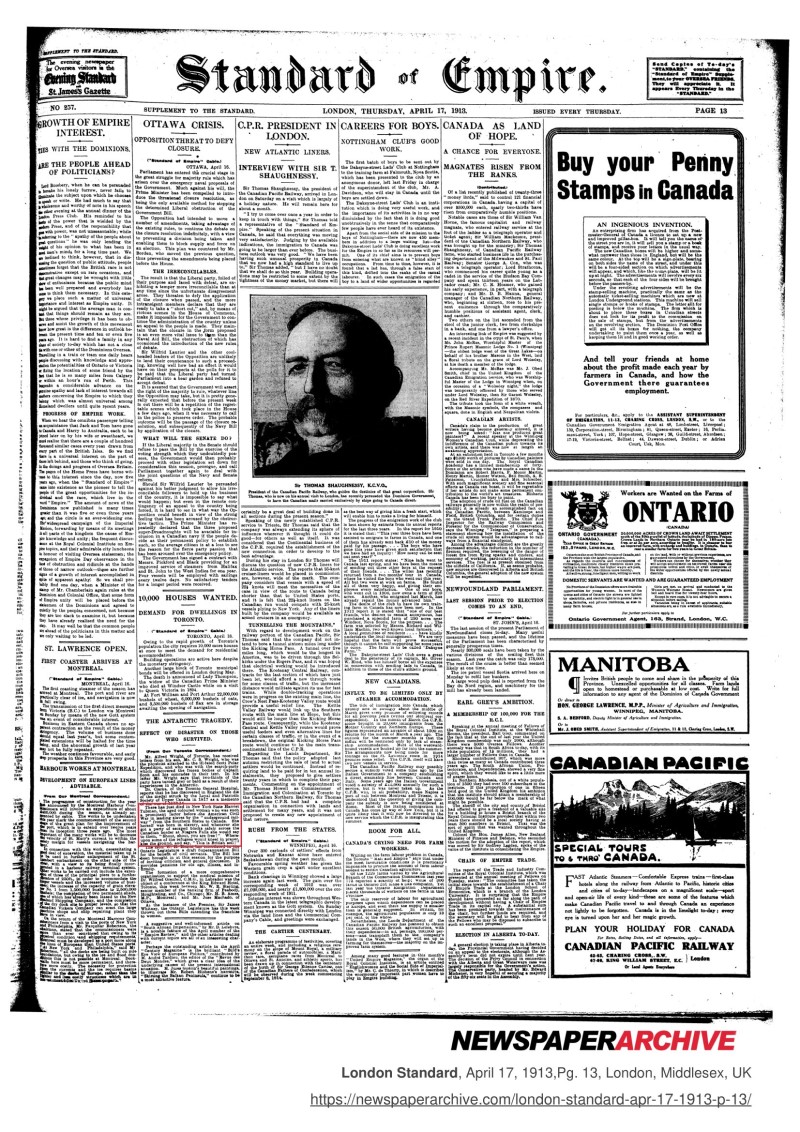News Mentions
From Abroad (Summary from Telegraph Agency Service)
UNITED STATES OF AMERICA – (A ship) Will have name of a black woman – The US Maritime Commission announces that plans to name an American merchant-ship with the name of a black woman, for the first time, on March 30 (Memorial Day). It will be Harriet Tubman. So far, twelve ships of this type bear the names of negro race men acknowledged for their actions
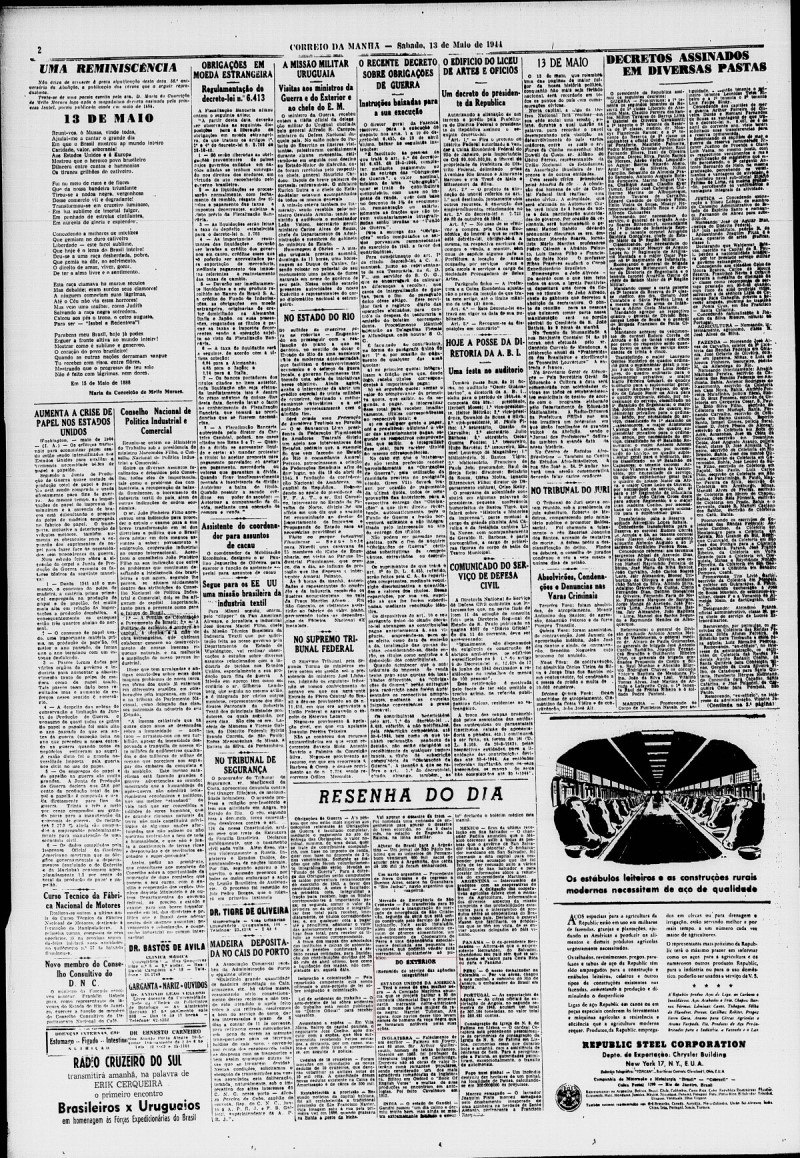

[…] Mrs. Tubman is a colored lady, of 35 or 40 years of age; she appeared before those present with a wounded h a n d in a bandage, which wound she stated was caused by maltreatment received at the hands of a conductor on the Camden and Amboy railroad, on her trip from Philadelphia to New York, a few days since. Her words were in the peculiar plantation dialect and at times were not intelligible to the white portion of her audience. There was nothing particularly impressive in her remarks: she was born, she said, in the eastern part of the State of Maryland, and wanted it to be distinctly understood that she was not educated, nor did she receive any “brought-en up;’ ‘she came up.”. Therefore, she conducted, she was not fit to mix in political matters. John Brown was one of her particular friends. Her master was a good man, but she knew that God had directed her to perform o the works in this world, and so she escaped from bondage. This was nearly 14 years ago, since then she was assisted hundreds to do the same. Her narration of her sickness, previous to her escape, was filled with negro phrases and elicited shouts of laughter from the congregation, the whites entering most heartily in to it Mrs. Tubman stated that she was known as Moses, having received that name from Lloyd Garrison, and she went on to speak of her experience […]

The Harper’s Ferry Raid. John Brown’s raid on Harper’s Ferry was directly participated in by twenty-three persons. There were several others who expected to be present. The fate is known of all but Francis Jack son Merriam, grandson of Francis Jackson , first president and only president of the American Anti-Slavery Society. Barclay Copple was killed at Platte Bridge, Missouri, in 1861, a lieu ten an tin the Fifth Kansas Volunteers. George Fidd Plummer died a t Roanoke Island as a sergeant of a Massachusetts regiment. Osbore R. Anderson, colored, died a clerk in Washington in 1870. Owen Brown still lives, F. J. Merriam is supposed to have died in Mexico, serving in the e Liberal army there after our war closed, but nobody really knows. All the other actual participants were killed in the fight or were hanged under the law after trial. Richard Realf, who was identified with the movement, committed suicide in October, 1879, in California. Wm. P. Gill lives in Cedar county, Iowa. Frank B. Sanborn lives at Concord. Harriet Tubman, colored, died during the war (?). William Harrison, for whom Albert Hazlitt was hanged, though the latter was a party to the raid, is still alive, and is a well-known journalist. Luke Parsons was killed as a soldier daring the w ar. Dr. Howe, Theodore Parker, Geo. L. Stearns and Gerritt Smith, who had knowledge of the movement, are all dead. Prof. Morton, who was Gerritt Smith ’s secretary, knew of the intended raid. C. W. Moffat, who was of the original band, still lives in Kansas

THE SUFFRAGISTS Proceedings at Their Meeting Held Yesterday.
The Non-Partisian society for political education for women held their regular meeting in the common council chamber yesterday afternoon. The attendance was not as large as at previous meetings, owing to the fact that several members of the society are ill with severe colds, however, all the seats inside the railing were occupied, over 20 ladies being present. The meeting was opened as usual with prayer, followed with the reading of the minutes of the last meeting by the secretary, Mrs. Mary K Laird which were approved by the society. The report of the committee on school suffrage and school election were next in order and letters from the assembly men of this county. A letter from Assembly man John E. Savery was read and sent great encouragement to the ladies. The letter stated than when any measure to advance the cause of school suffrage for the women of Cayuga county was presented, he, Mr. Savery, would do all in his power and use his influence to secure them the right of school suffrage. The interview with City Attorney O’Brien was reported by the committee appointed to wait on him and the ladies reported a very pleasant talk and esteemed him as a true friend and pleasant and affable official ready and willing to assist and Inform all citizens who apply for information with regard to the city law Mrs. Amanda Alley and Mrs. Alma L. Peck were appointed to confer with the Rev. J. J. Brayton as to the time and place of holding the meeting at which he is to address the ladies of the society. The president, Mrs. J. M. Pearson, read a selection written by Miss Francis E Willard, the national president of the W. C. T. U on the study of school politics for woman Miss Willard advices all woman to study politics, especially temperance women Mrs. Pearson said that words from such a power as Miss Willard, ought certainly to lend encouragement to all women to help along a reform, espoused and supported by the greatest minds of the 10:h century, u this point Harriet Tubman the noted women, scout and soldier of the late rebellion called and was introduced by the president to the society. In view of Mrs. Tubman's services in the late war, in freeing and helping to emancipate her down trodden and oppressed rare, the ladies of the Society requested that she say a few words before the society With a polite courtesy the venerable Harriet prefaced her remarks by saying that she had not presented herself before tin society to teach them but rather to learn and be taught. The lessons learned in the late war by her as scout, soldier, nurse and protector of her people, resulted in her graphic and quaint way added much to the interest of her story. Her experience was indeed thrilling She spoke affectionately of her friends of the war most of whom have passed away among those personalities mentioned were the late and honored Secretary William H. Seward, William Lloyd Garrison, John Brown and Wendell. President Lincoln also championed her cause and secured her an Important commission in the war Her recital of the brave and fearless deeds of women who sacrificed all for their country and moved in battle when bullets mowed down men, file after file, and rank after rank, was graphic. Loving women were on the scene to administer to the injured, to bind up their wounds and tend them through weary months of suffering in the army hospitals If those deeds do not place woman as man’s equal, what do. The speaker said that her prayers carried her through and they would eventually place woman at the ballot-box with man as his equal. Her speech, though brief was very interesting, and was listened to with wrapped attention by all Harriet Tubman served 25 years as a slave, 11 years in the work of freeing her race from the bondage of slavery and four years in the late war A letter was read by Miss M. B. Fosgate from Miss Emily Howland of Sherwood on the suffrage question and the interest and enthusiasm on this important subject by the women and men in the east. Mrs. Dr. Morse made a few remarks with regard to women’s work as viewed from the suffrage stand point. Letters of invitation from the committee on invitations to the national convention of woman suffragists to he held in Washington from March 23 to April 1 were received. It is not yet decided whether the non-Partisan society of Auburn will be represented at this convention or not; however, many and cordial are the invitations extended to the members to be present. The society adjourned at 6 p. m. to meet in the common council chamber March 28 at 2:30 o’clock. It U probable that the executive committee will meet before the next regular meeting as important business is to be transacted in the meantime.
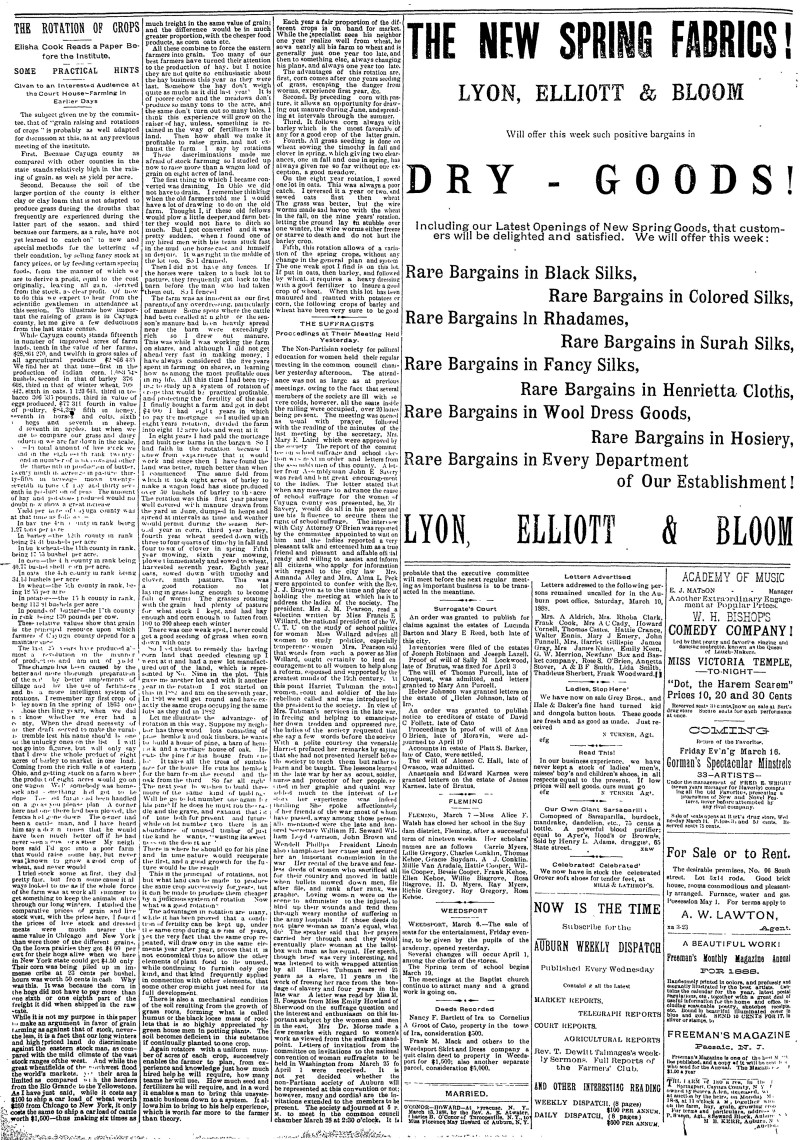
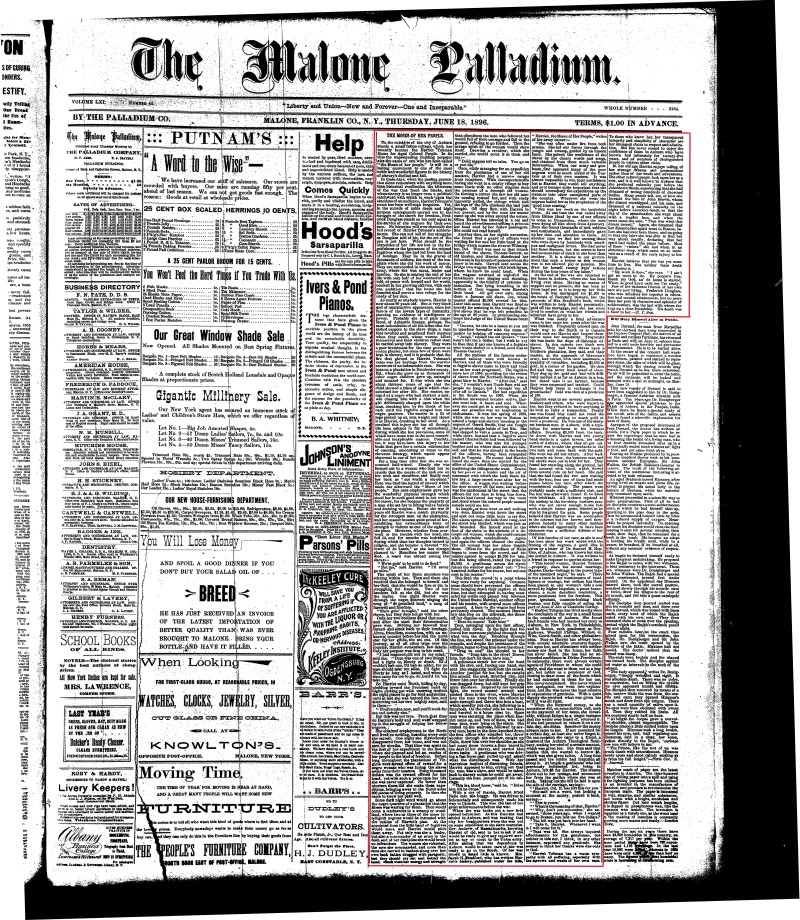
The Negro Moses
Mrs. Harriet Tubman, once called the “Moses of her people,” and for whose bead slave owners offered a reward of 40.000, Is in Boston. She was born about 1820 in Dorchester county and was the grand-daughter of a slave brought from Africa. About 1844 she married a free colored man named John Tubman, but had no children. During the last two years of her slavery she lived in the family or Dr. Thompson. In 1849 the man to whom she belonged died, and by the provisions of the will the slaves were to be set free. His wishes, however, were disregarded, and arrangements were made to dispose of them in the usual way. Previous to the sale Mrs. Tubman made her escape and reached Philadelphia, where she found work and earned money. With this she travelled back to Maryland for her husband, but found that he had married again. Between 1850 and 1860 she made no less than 19 trips to the south and spirited away more than 300 slaves. Her work in aiding fugitive slaves enraged the slave owners, and every effort was made to apprehend her. A reward of 40,000 was finally offered by them for her, either dead or alive. On this account she was able to do but little toward assisting her people between 1852 and 1857. At the breaking out of the war she was sent to the front by Governor Andrew, of Massachusetts to act as a spy and scout for the Union armies and to work in the hospital. This she did for four years without remuneration. She was with the Fifty-fourth Massachusetts. Since the war she has done a little lecturing and at present is trying to secure funds to build a home for colored widows
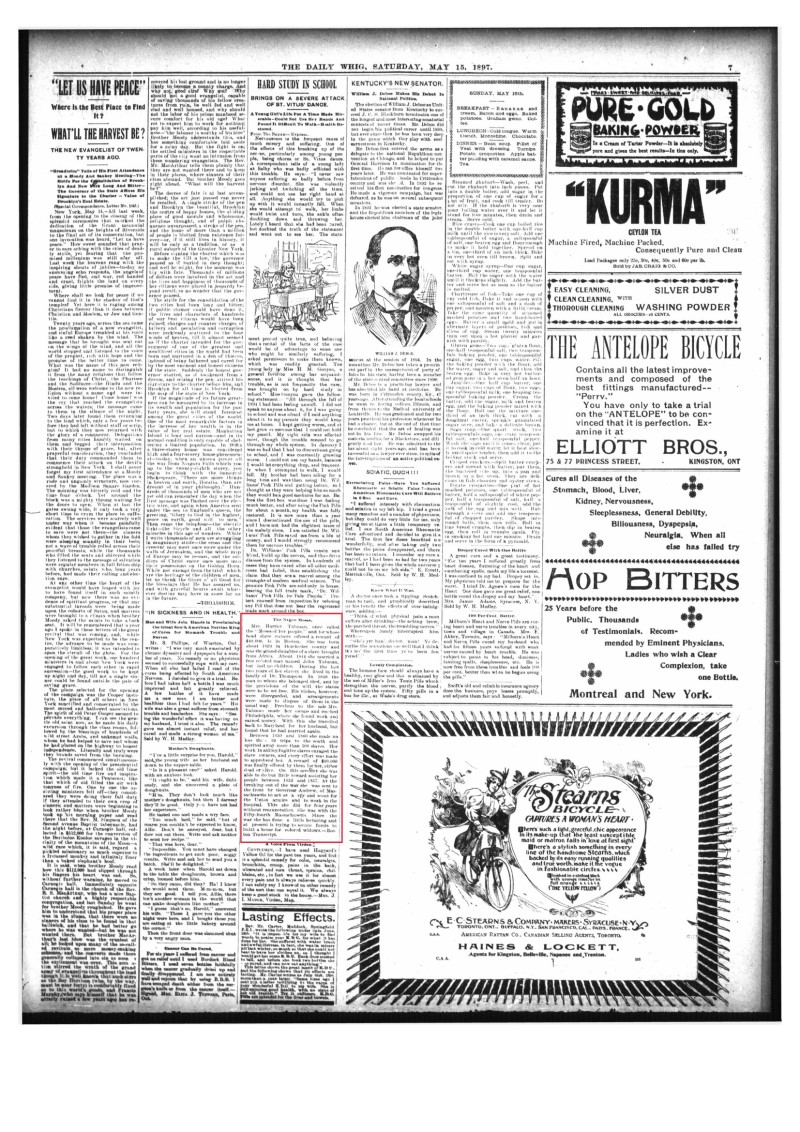
(A black Joan of Arc.)
A home for decrepit Negroes has recently been established near the city of Auburne in the United States, named after its founder, an eighty-year-old Negress named Harrient (sic) Tubman.
Harriet was a slave from her earliest youth, but not a very willing and humble one. She always bothered her lookers, and even as a thirteen-year-old girl had the courage to attack one of her white fighters who had ruthlessly beaten a poor sick slave, which of course did not affect her own situation.
Barely nineteen years old, Harriet managed to escape from her master and, defying the greatest dangers, reach the northern states on foot, where slavery had already been abolished. There she was declared free, and with the greatest zeal, she immediately began to work independently and put aside every penny that she could save on the mouth.
As soon as she had raised enough money, she headed south, and wherever she encountered slaves fleeing, she helped them win the land of freedom. In this way she brought a whole army of blacks to northern America, all of whom had escaped their masters. She knew how to show hidden ways to fugitives, occulting them so skilfully from their persecutors that none of her protégés fell into the hands of the capturers.
After the daring girl had carried out numerous expeditions of this kind with great success, the slave owners formed a union and offered a $ 10,000 reward to whoever would deliver Harriet Tubman into their hands. But like a Joan of Arc, as if protected by a higher power, she escaped all the traps laid upon her.
When the war of liberation broke out, she made Auburne her headquarters, and from there she formed rescue trains. The governor (John A.) Andrews of Massachusetts, whom her call had reached, asked her to serve as leader of the Union Army. She consented and, facing every danger, she even put her husband in the midst of the danger. She led the army across the jungles and swampy areas and discovered a previously unknown country on Missouri.
Harriet always had the unlimited trust of her poor black brothers, to whose liberation she can boast of having contributed infinitely. The still very sprightly old woman has now crowned her noble-hearted endeavors, guided by the purest philanthropy, by founding her home near Auburne.
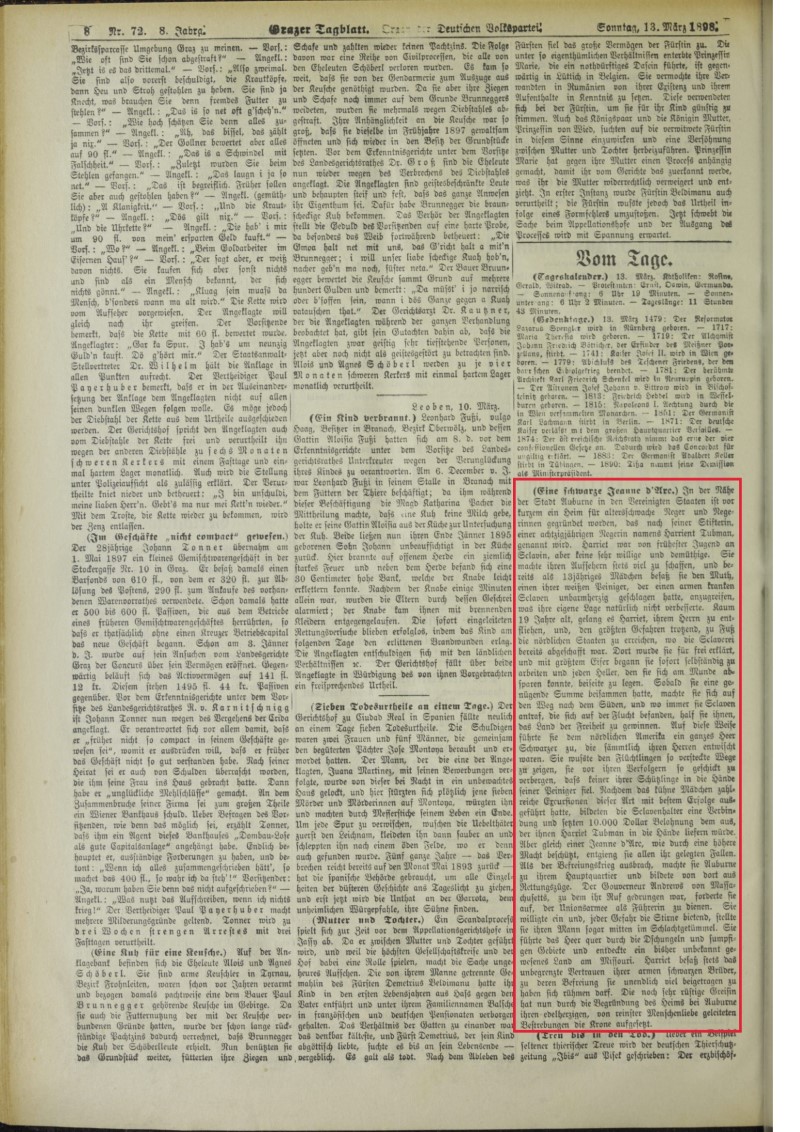
From the time of Negro slavery
In the vicinity of the city of Auburn in America a foundation has been established for elaborate and sick Negroes of both sexes. It is an 80-year-old Negro Harriet Tubman Home that has the honour of this human enterprise.
In her youth, Harriet Tubman was a slave girl on a plantation in South Carolina. At the age of 19, she managed to escape and, after multiple dangers, escaped to the northern states, where slavery had already been abolished. She was the one who inspired Harriet Becher Stowe for the novel "Uncle Tom’s Cabin."
From her safe haven in the northern states, Harriet Tubman began to develop an energetic agitation against Negro slavery. She helped a number of slaves escape and resented the fact that they promised a reward of 10,000 dollars to anyone who could bring Harriet into their hands. However, their plans failed.
In the war between the north and the southern states, bon did the poor states of the northern states through their secure local knowledge and through their sacrificial care for the wounded. Sometimes she herself took part in the battle and had killed three enemy dragoons on her own.
On her eighth birthday, which occurred last month, she received a personal letter from Leo Tolstoy.
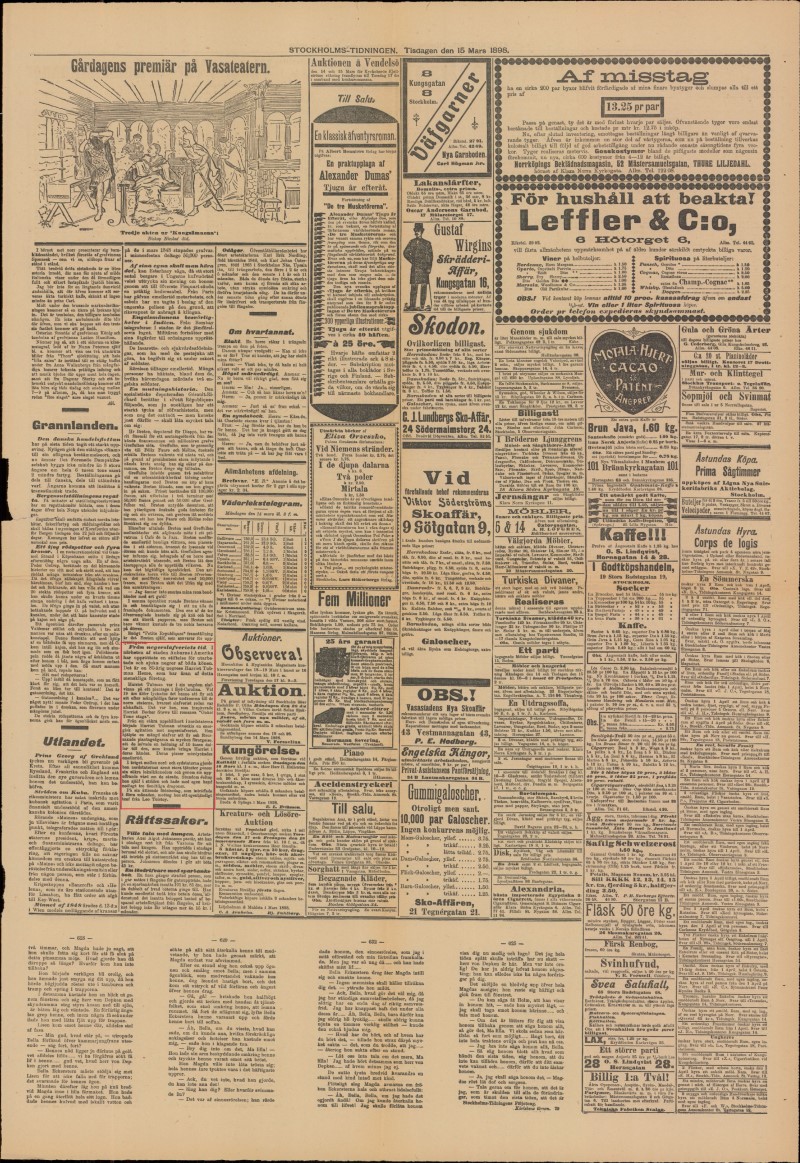
A Humane Negro
Near Auburn in the United States, a kind of "Home" has been established for the Negroes and Negroes, which will be named "Harriet Tubman Home" after the founders.
This Harriet had been a slave girl, but in her negativity year she managed to escape her master and defy all dangers to reach the Northern States, where slavery had been abolished.
There she was declared free and began to lay aside some of every dollar she earned, until after years she had accumulated a somewhat sufficient sum with which she set out for the South to help other slaves to get to the land of the free hero. came with the result that the slave-houses offered 10,000 dollars to whoever could hand them over Harriet.
However, she always managed to escape.
When the Revolutionary War broke out, the Massachusetts governor asked her to serve as a guide to the Union army. She led the army across the swampy regions of the Missouri.
Harriet always cherishes the boundless confidence of her poor black brethren, to whose liberation she contributes infinitely.
The now 80-year-old Negress has crowned her work with the foundation of the Home.
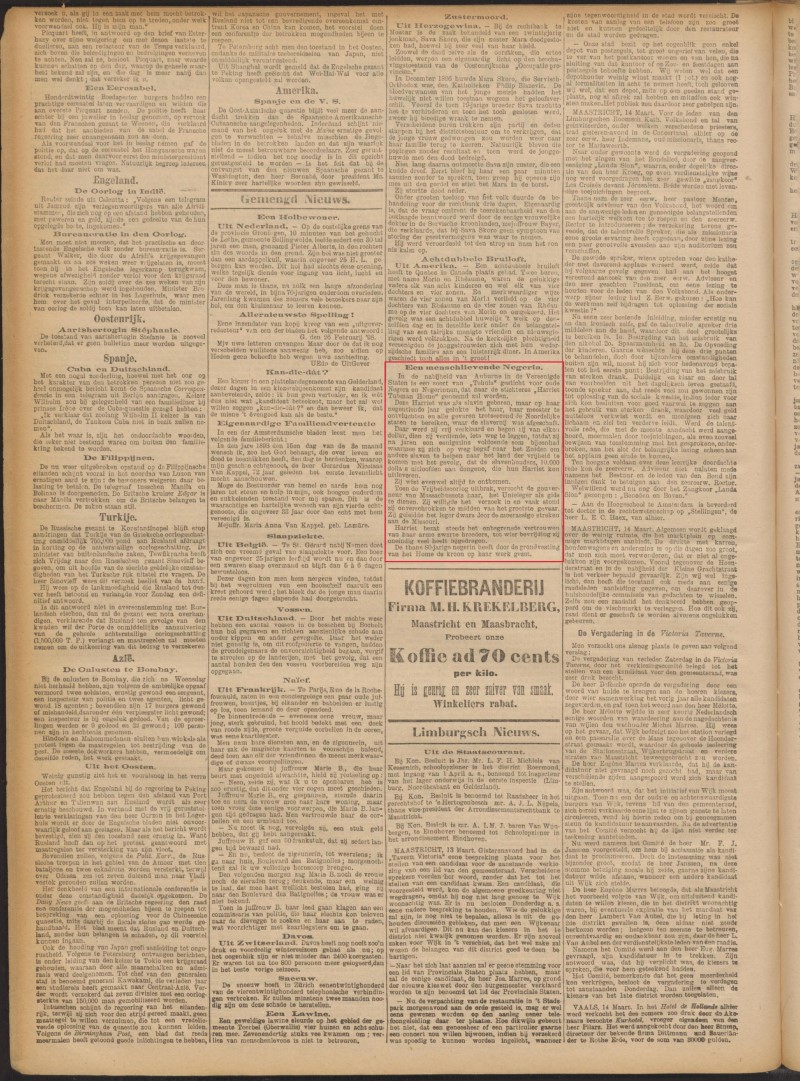
A black heroine.
A few days ago a home for decrepit Negroes was founded near the city of Auburne in the United States, which is called the "Harrtet Tubman Home" after its founder, an 80-year-old Negress. Harriet was a slave, but when she was 19 years old she managed to escape from her master and, defying the greatest dangers, to reach the northern states, where slavery had been abolished.
There she was declared free and with the greatest zeal she immediately began to work independently and put aside every penny that she could spare. As soon as she raised enough money, she headed south and helped other slaves win the land of freedom, with such success that the slaveholders offered $ 10,000 in reward to whoever brought them Harriet Tubman Hands would deliver. But she always escaped the traps laid on her.
When the war of liberation broke out, Governor Andrews von Maffachusets asked her to serve as leader of the Union Army. She agreed and, offering the siren to every danger, she often stood in the middle of the battle. She led the army across the swampy areas of the Missouri. Harriet has always had the unlimited trust of her poor black brothers, to whose liberation she has contributed immensely. The still very sprightly old woman has now exposed the crown to her noble-hearted endeavors by establishing the "home" near Auburne."
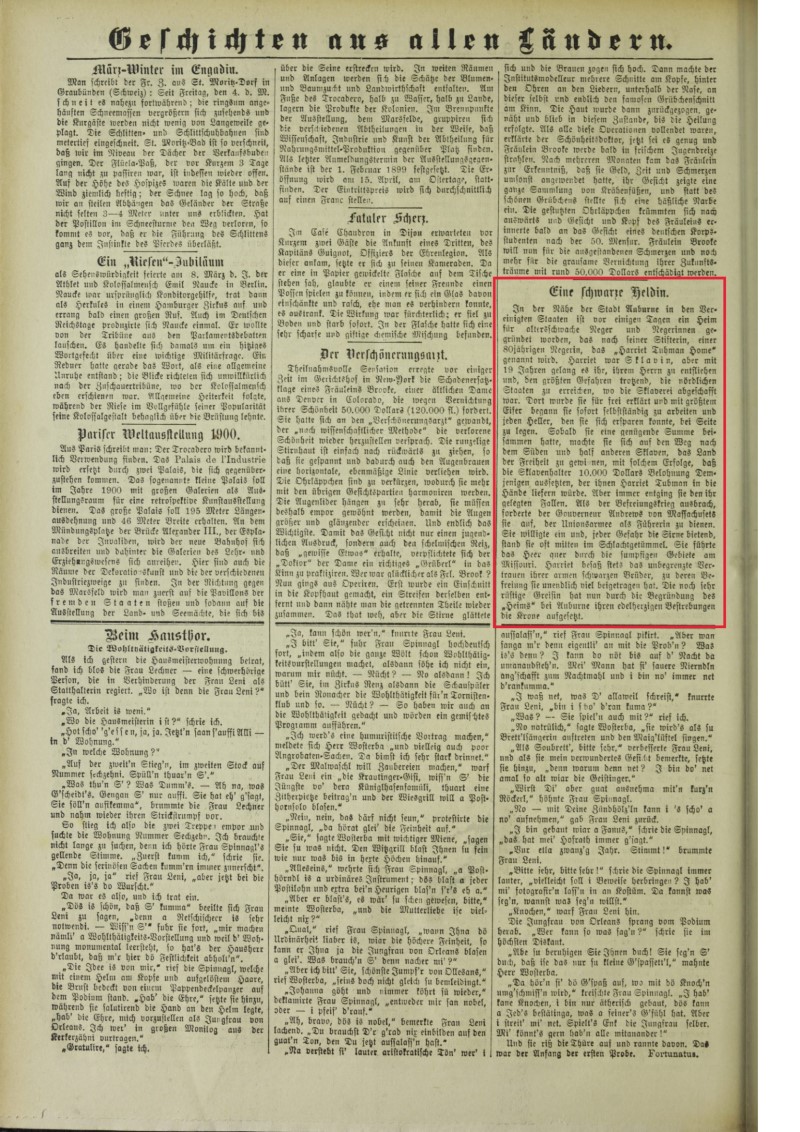
A black heroine
In the vicinity of the State of Auburn in the United States, a home has been established for elderly Negroes and Negroes; it is named after its founder, an 80-year-old Negro woman, and is called "Harriet Tubman Home."
Harriet was a slave, but in her twentieth year she managed to escape from her master, and, despite the greatest dangers, to reach the northern states, where declared free, and began with the greatest zeal to work independently and set aside every penny which she could in some way dispense with.
As soon as she had agreed on a sufficient sum, she began to icy on the way to the southern states and helped other slaves to reach the land of freedom. She had such luck with her that the slaveholders provided a reward of 10,000 dollars for anyone who could deliver Harriet Tubman in their honor; she, however, happily avoided the traps laid before her.
When the War of Independence broke out, the Governor of Massachusetts urged her to accept a leadership position in the Union Church. She agreed, and despite all the dangers, she often stood in the middle of the tumult.
Harriet always had the full confidence of her black brothers, and she has seemed exceedingly sorry for their liberation. The old, but still quite messy and still quite still completely sane woman had now put the crown on her noble endeavors by setting up her home in Auburn
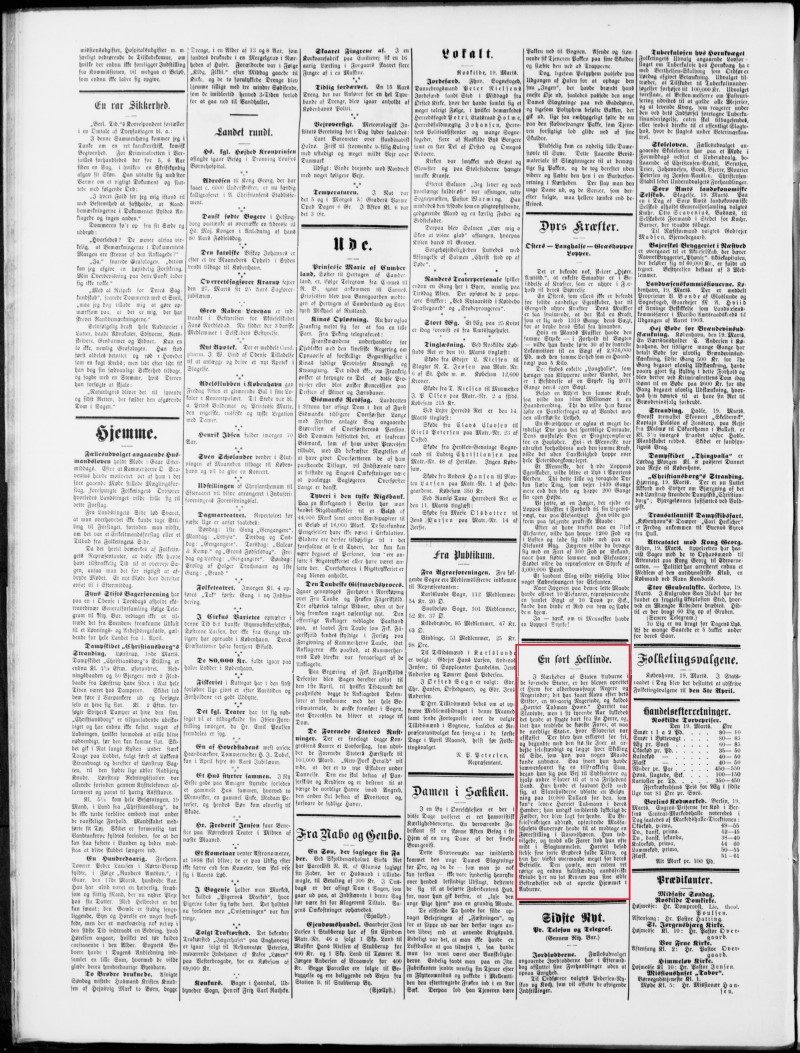
Harriet Tubman is the name of an old Negro woman who lives near New York. She was born in 1814 and was the Daughter of Slaves. At a young age she married, and there was little talk of marrying her to Avklion. Then she fled, and she managed to reach Philadelphia, where the Quakers sought refuge.
And from now on she made increasingly longer and longer excursions to the south, where she persuaded her companions to flee from the conditions in which they lived. Her whereabouts became known, however, and she had to move all the way up to Canada with her colony of escaped slaves. Nevertheless, she continued fine expeditions, and a breeze of DKK 160,000 was promised. for her Head. But nonetheless, she managed to save her life. In all, Hua must have freed 3,000 people from slavery.
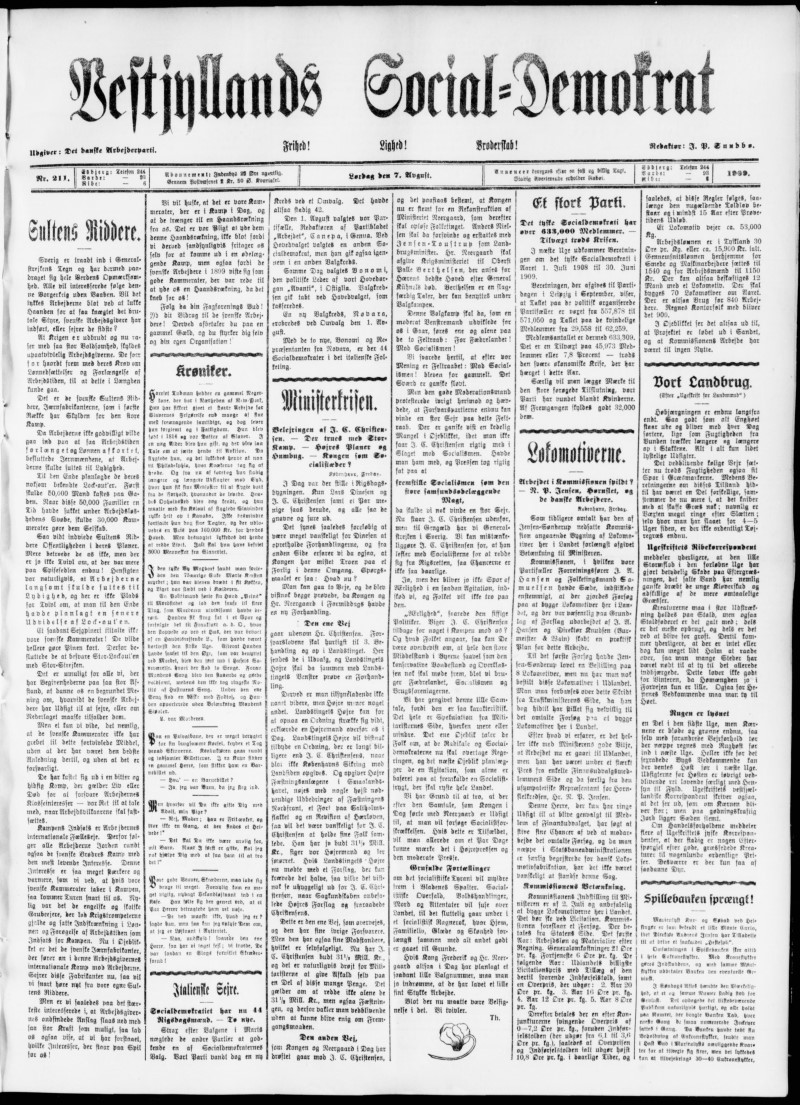
(From Our Toronto Correspondent.)
[…] There has just died in New York State Harriet Tubman, the aged coloured woman who was such a prominent factor before the American Civil War in leading slaves by the “ underground railway” from the Southern States to Canada. She herself was born in slavery, and whenever she got a party of escaped blacks safely across the Canadian border at Niagara Falls she would say to them, “ Shout, shout, you are free 1 ” Whereupon some of the refugees would kneel in prayer, kiss the ground, and say, “ This is British soil […]
